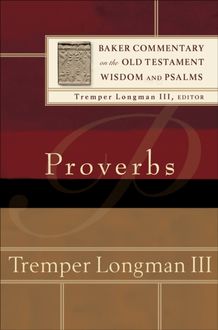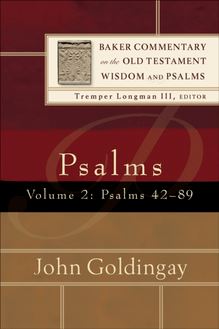Psalms : Volume 2 (Baker Commentary on the Old Testament Wisdom and Psalms) , livre ebook
574
pages
English
Ebooks
2007
Vous pourrez modifier la taille du texte de cet ouvrage
Obtenez un accès à la bibliothèque pour le consulter en ligne En savoir plus
Découvre YouScribe en t'inscrivant gratuitement
Découvre YouScribe en t'inscrivant gratuitement
574
pages
English
Ebooks
2007
Vous pourrez modifier la taille du texte de cet ouvrage
Obtenez un accès à la bibliothèque pour le consulter en ligne En savoir plus
Publié par
Date de parution
01 novembre 2007
Nombre de lectures
0
EAN13
9781441205322
Langue
English
Publié par
Date de parution
01 novembre 2007
Nombre de lectures
0
EAN13
9781441205322
Langue
English
© 2007 by John Goldingay
Published by Baker Academic
a division of Baker Publishing Group
P.O. Box 6287, Grand Rapids, MI 49516–6287
www.bakeracademic.com
Ebook edition created 2013
All rights reserved. No part of this publication may be reproduced, stored in a retrieval system, or transmitted in any form or by any means for example, electronic, photocopy, recording without the prior written permission of the publisher. The only exception is brief quotations in printed reviews.
ISBN 978-1-4412-0532-2
Library of Congress Cataloging-in-Publication Data is on file at the Library of Congress, Washington, DC.
The internet addresses, email addresses, and phone numbers in this book are accurate at the time of publication. They are provided as a resource. Baker Publishing Group does not endorse them or vouch for their content or permanence.
Contents
Cover
Title Page
Copyright Page
Series Preface
Author’s Preface
Abbreviations
Psalms 42–43: Coping with Separation from God’s Presence
Psalm 44: Coping with Defeat
Psalm 45: The True King and True Queen
Psalm 46: Trust and Stop
Psalm 47: God Has Begun to Reign
Psalm 48: God Made Known in the City of God
Psalm 49: Can Death Be Escaped?
Psalm 50: Worship and Life
Psalm 51: Sin, Cleansing, Renewal
Psalm 52: Divine and Human Commitment
Psalm 53: Is God There?
Psalm 54: The Name That Rescues
Psalm 55: How to Throw Things at Yhwh
Psalm 56: Fear of Humanity, Trust in God
Psalm 57: Simultaneously Expecting and Possessing
Psalm 58: The Gods Must and Will Fulfill Their Responsibility
Psalm 59: How to Pray in Terror
Psalm 60: How to Claim God’s Past Word
Psalm 61: How Prayer Suspends the Distantness
Psalm 62: The Heart of Old Testament Theology
Psalm 63: A Threefold Dynamic for Life
Psalm 64: The Power of Language and the Power of Recollection
Psalm 65: Politics and Harvest, Israel and the World
Psalm 66: Praise and Thanksgiving, Community and Individual, Israel and the World
Psalm 67: Blessed for the Sake of the World
Psalm 68: God Then and Now
Psalm 69: When People Mock Zeal for Yhwh’s House
Psalm 70: A Plea for Haste
Psalm 71: The God of Past, Present, and Future
Psalm 72: A Vision for Government
Psalm 72:18–20: Coda to Book II
Psalm 73: Yes, God Will Restore Me
Psalm 74: What Is Permanent?
Psalm 75: In Your Way and in Your Time
Psalm 76: Revere or Fear
Psalm 77: The Pain and the Hope of Recollection
Psalm 78: The Story That Needs Passing On
Psalm 79: When Nations Attack Us and Scorn God
Psalm 80: Praying for Joseph
Psalm 81: Do Listen!
Psalm 82: God Must Accept Responsibility
Psalm 83: Confrontation, Shame, Death, Acknowledgment
Psalm 84: The Double Good Fortune of the Trusting Person
Psalm 85: God Speaks of Shalom
Psalm 86: A Servant’s Claim on His Master
Psalm 87: The Nations as Citizens of Zion
Psalm 88: Abba, Father
Psalm 89: Facing Two Sets of Facts (Again)
Psalm 89:52: Coda to Book III
Glossary
Notes
Bibliography
Subject Index
Author Index
Index of Scripture and Other Ancient Writings
Series Page
Series Preface
At the end of the book of Ecclesiastes, a wise father warns his son concerning the multiplication of books: “Furthermore, of these, my son, be warned. There is no end to the making of many books!” (12:12). The Targum to this biblical book characteristically expands the thought and takes it in a different, even contradictory, direction: “My son, take care to make many books of wisdom without end.”
When applied to commentaries, both statements are true. The past twenty years have seen a significant increase in the number of commentaries available on each book of the Bible. On the other hand, for those interested in grappling seriously with the meaning of the text, such proliferation should be seen as a blessing rather than a curse. No single commentary can do it all. In the first place, commentaries reflect different theological and methodological perspectives. We can learn from others who have a different understanding of the origin and nature of the Bible, but we also want commentaries that share our fundamental beliefs about the biblical text. Second, commentaries are written with different audiences in mind. Some are addressed primarily to laypeople, others to clergy, and still others to fellow scholars. A third consideration, related to the previous two, is the subdisciplines the commentator chooses to draw from to shed light on the biblical text. The possibilities are numerous, including philology, textual criticism, genre/form criticism, redaction criticism, ancient Near Eastern background, literary conventions, and more. Finally, commentaries differ in how extensively they interact with secondary literature, that is, with what others have said about a given passage.
The Baker Commentary on the Old Testament Wisdom and Psalms has a definite audience in mind. We believe the primary users of commentaries are scholars, ministers, seminary students, and Bible study leaders. Of these groups, we have most in mind clergy and future clergy, namely, seminary students. We have tried to make the commentary accessible to nonscholars by putting most of the technical discussion and interaction with secondary literature in the footnotes. We do not mean to suggest that such information is unimportant. We simply concede that, given the present state of the church, it is the rare layperson who will read such technical material with interest and profit. We hope we are wrong in this assessment, and if we are not, that the future will see a reverse in this trend. A healthy church is a church that nourishes itself with constant attention to God’s words in Scripture, in all their glorious detail.
Since not all commentaries are alike, what are the features that characterize this series? The message of the biblical book is the primary focus of each commentary, and the commentators have labored to expose God’s message for his people in the book they discuss. This series also distinguishes itself by restricting its coverage to one major portion of the Hebrew Scriptures, namely, the Psalms and Wisdom books (Proverbs, Job, Ecclesiastes, and Song of Songs). These biblical books provide a distinctive contribution to the canon. Although we can no longer claim that they are neglected, their unique content makes them harder to fit into the development of redemptive history and requires more effort to hear their distinctive message.
The book of Psalms is the literary sanctuary. Like the physical sanctuary structures of the Old Testament, it offers a textual holy place where humans share their joys and struggles with brutal honesty in God’s presence. The book of Proverbs describes wisdom, which on one level is skill for living, the ability to navigate life’s actual and potential pitfalls; but on another level, this wisdom presents a pervasive and deeply theological message: “The fear of the L ORD is the beginning of knowledge” (Prov. 1:7). Proverbs also raises a disturbing issue: the sages often motivate wise behavior by linking it to reward, but in reality, bad things happen to good people, and the wise are not always rewarded as they expect. This raises the question of the justice of God. Both Job and Ecclesiastes struggle with the apparent disconnect between God’s justice and our actual life experience. Finally, the Song of Songs is a passionate, sensuous love poem that reminds us that God is interested in more than just our brains and our spirits; he wants us to enjoy our bodies. It reminds us that we are not merely souls encased in bodies but whole persons made in God’s image.
Limiting the series to the Psalms and Wisdom books has allowed us to tailor our work to the distinctive nature of this portion of the canon. With some few exceptions in Job and Ecclesiastes, for instance, the material in these biblical books is poetic and highly literary, and so the commentators have highlighted the significant poetic conventions employed in each book. After an introduction discussing important issues that affect the interpretation of the book (title, authorship, date, language, style, text, ancient Near Eastern background, genre, canonicity, theological message, connection to the New Testament, and structure), each commentary proceeds section by section through the biblical text. The authors provide their own translation, with explanatory notes when necessary, followed by a substantial interpretive section (titled “Interpretation”) and concluding with a section titled “Theological Implications.” In the interpretation section, the emphasis is on the meaning of the text in its original historical setting. In the theological implications section, connections with other parts of the canon, both Old and New Testaments, are sketched out along with the continuing relevance of each passage for us today. The latter section is motivated by the recognition that, while it is important to understand the individual contribution and emphasis of each book, these books now find their place in a larger collection of writings, the canon as a whole, and it is within this broader context that the books must ultimately be interpreted.
No two commentators in this series see things in exactly the same way, though we all share similar convictions about the Bible as God’s Word and the belief that it must be appreciated not only as ancient literature but also as God’s Word for today. It is our hope and prayer that these volumes will inform readers and, more importantly, stimulate reflection on and passion for these valuable books.
It has long been observed that the book of Psalms is a “microcosm” of the message of the Old Testament. Athanasius, the fourth-century theologian, called the Psalms “an epitome of the whole Scriptures.” Basil, bishop of Caesarea in the same time period, regarded the Psalms as a “compendium of all theology.” Martin Luther said the book is “a little Bible, and the


